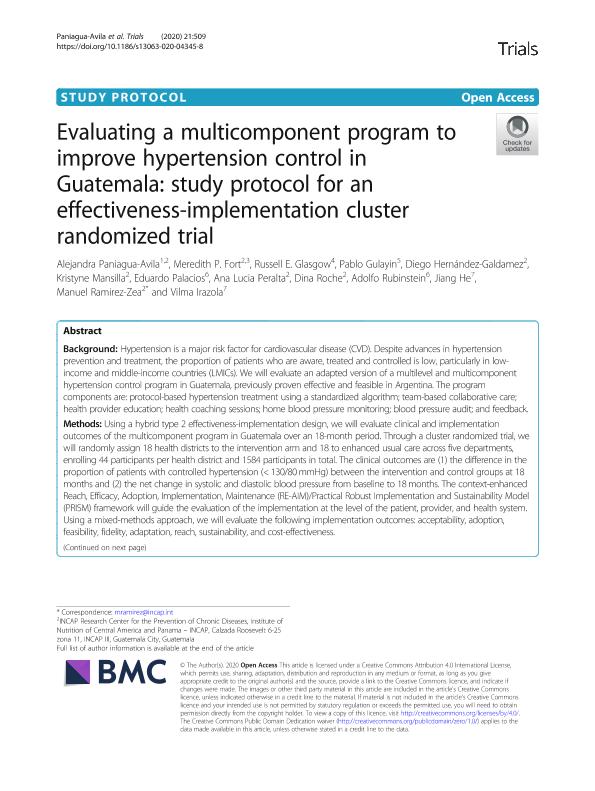Artículo
Evaluating a multicomponent program to improve hypertension control in Guatemala: Study protocol for an effectiveness-implementation cluster randomized trial
Paniagua Avila, Alejandra; Fort, Meredith P.; Glasgow, Russell E.; Gulayin, Pablo Elías; Hernández Galdamez, Diego; Mansilla, Kristyne; Palacios, Eduardo; Peralta, Ana Lucia; Roche, Dina; Rubinstein, Adolfo Luis ; He, Jiang; Ramirez Zea, Manuel; Irazola, Vilma
; He, Jiang; Ramirez Zea, Manuel; Irazola, Vilma
 ; He, Jiang; Ramirez Zea, Manuel; Irazola, Vilma
; He, Jiang; Ramirez Zea, Manuel; Irazola, Vilma
Fecha de publicación:
06/2020
Editorial:
BioMed Central
Revista:
Trials
ISSN:
1745-6215
Idioma:
Inglés
Tipo de recurso:
Artículo publicado
Clasificación temática:
Resumen
Background: Hypertension is a major risk factor for cardiovascular disease (CVD). Despite advances in hypertension prevention and treatment, the proportion of patients who are aware, treated and controlled is low, particularly in low-income and middle-income countries (LMICs). We will evaluate an adapted version of a multilevel and multicomponent hypertension control program in Guatemala, previously proven effective and feasible in Argentina. The program components are: protocol-based hypertension treatment using a standardized algorithm; team-based collaborative care; health provider education; health coaching sessions; home blood pressure monitoring; blood pressure audit; and feedback.Methods: Using a hybrid type 2 effectiveness-implementation design, we will evaluate clinical and implementation outcomes of the multicomponent program in Guatemala over an 18-month period. Through a cluster randomized trial, we will randomly assign 18 health districts to the intervention arm and 18 to enhanced usual care across five departments, enrolling 44 participants per health district and 1584 participants in total. The clinical outcomes are (1) the difference in the proportion of patients with controlled hypertension (< 130/80 mmHg) between the intervention and control groups at 18 months and (2) the net change in systolic and diastolic blood pressure from baseline to 18 months. The context-enhanced Reach, Efficacy, Adoption, Implementation, Maintenance (RE-AIM)/Practical Robust Implementation and Sustainability Model (PRISM) framework will guide the evaluation of the implementation at the level of the patient, provider, and health system. Using a mixed-methods approach, we will evaluate the following implementation outcomes: acceptability, adoption, feasibility, fidelity, adaptation, reach, sustainability, and cost-effectiveness.Discussion: We will disseminate the study findings, and promote scale up and scale out of the program, if proven effective. This study will generate urgently needed data on effective, adoptable, and sustainable interventions and implementation strategies to improve hypertension control in Guatemala and other LMICs.
Archivos asociados
Licencia
Identificadores
Colecciones
Articulos(CIESP)
Articulos de CENTRO DE INVESTIGACIONES EN EPIDEMIOLOGIA Y SALUD PUBLICA
Articulos de CENTRO DE INVESTIGACIONES EN EPIDEMIOLOGIA Y SALUD PUBLICA
Citación
Paniagua Avila, Alejandra; Fort, Meredith P.; Glasgow, Russell E.; Gulayin, Pablo Elías; Hernández Galdamez, Diego; et al.; Evaluating a multicomponent program to improve hypertension control in Guatemala: Study protocol for an effectiveness-implementation cluster randomized trial; BioMed Central; Trials; 21; 1; 6-2020; 1-11
Compartir
Altmétricas



